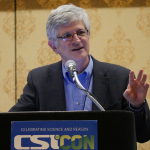Unlike previous public health emergencies, the COVID-19 pandemic had unmistakably partisan overtones. Politics exerted an unhealthy influence on how governments, scientists, reporters and ordinary Americans responded as SARS-CoV-2 swept across the world and upended our lives for the better part of four years. What went wrong and what can we learn from it?
ACSH Science Dispatch Podcast
My recent chat with John Batchelor broached the important subject of flawed, non-reproducible scientific studies that find their way into journals. It seems that replicating results is as rare as finding a unicorn at a science fair.
From vaccines and AI innovations to imminent breakthroughs, discover the cutting-edge advancements shaping the future of healthcare in this conversation with radio host Mark Hahn.
The Bible of science – the body of peer-reviewed literature – is increasingly filled with dubious and even fraudulent research. Most academics openly recognize the threat this poses to scientific progress, though viable solutions to academic fraud are sorely lacking. How do we address this critical problem?
Loud noises and ... trace minerals? Let's break down a new study examining an important contributor to age-related hearing loss. Spoiler alert: stocking up on zinc supplements is not the solution.
Censorship in science, GMOs, opioids and the health effects of porn use. Come listen to my wide-ranging discussion with podcaster Vance Crowe.
NPR recently lost its nerve over the realization that some men are giving up internet porn, fearing this "masturbation abstinence" trend is a gateway to radical right-wing politics. The media should be more interested in the potentially serious health impacts of porn itself.
The FDA has proposed changing the classification of marijuana from a Schedule I to a Schedule III drug. What impacts could this regulatory status change have on public health and drug regulation around the U.S.? Let's listen in.
In a recent radio conversation with John Batchelor on CBS Eye on the World, we discussed plants' need for nitrogen, the use of fertilizers, and the potential for genetic engineering to maintain agricultural productivity and reduce detrimental environmental impact.
Lars Larson and I discussed on-air the declining rates of vaccination, as reported by both the World Health Organization and in FDA Commissioner Robert Califf's recent article about a potential tipping point in U.S. vaccinations.









